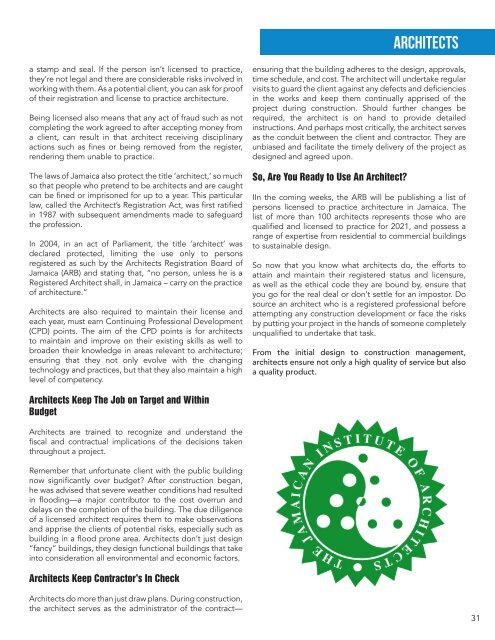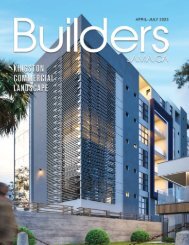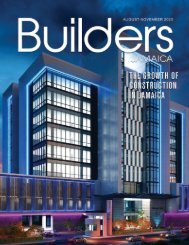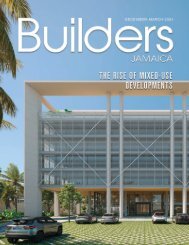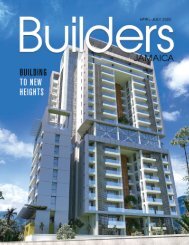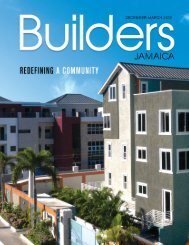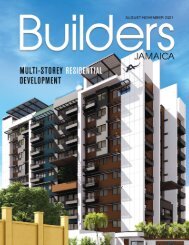Builders Jamaica April-July 2021
Builders Jamaica is a B2B publication focused on the latest developments within the construction industry. The editorial will be distinct in the way it conveys information on architectural trends, interior and exterior décor, the latest building technologies and projects across Jamaica. Builders Jamaica is designed to be informative and educational. We will make it easy for the reader and consumer to choose from different products and services whenever planning, developing, or renovating.
Builders Jamaica is a B2B publication focused on the latest developments within the construction industry. The editorial will be distinct in the way it conveys information on architectural trends, interior and exterior décor, the latest building technologies and projects across Jamaica. Builders Jamaica is designed to be informative and educational. We will make it easy for the reader and consumer to choose from different products and services whenever planning, developing, or renovating.
You also want an ePaper? Increase the reach of your titles
YUMPU automatically turns print PDFs into web optimized ePapers that Google loves.
ARCHITECTS<br />
a stamp and seal. If the person isn’t licensed to practice,<br />
they’re not legal and there are considerable risks involved in<br />
working with them. As a potential client, you can ask for proof<br />
of their registration and license to practice architecture.<br />
Being licensed also means that any act of fraud such as not<br />
completing the work agreed to after accepting money from<br />
a client, can result in that architect receiving disciplinary<br />
actions such as fines or being removed from the register,<br />
rendering them unable to practice.<br />
The laws of <strong>Jamaica</strong> also protect the title ‘architect,’ so much<br />
so that people who pretend to be architects and are caught<br />
can be fined or imprisoned for up to a year. This particular<br />
law, called the Architect’s Registration Act, was first ratified<br />
in 1987 with subsequent amendments made to safeguard<br />
the profession.<br />
In 2004, in an act of Parliament, the title ‘architect’ was<br />
declared protected, limiting the use only to persons<br />
registered as such by the Architects Registration Board of<br />
<strong>Jamaica</strong> (ARB) and stating that, “no person, unless he is a<br />
Registered Architect shall, in <strong>Jamaica</strong> – carry on the practice<br />
of architecture.”<br />
Architects are also required to maintain their license and<br />
each year, must earn Continuing Professional Development<br />
(CPD) points. The aim of the CPD points is for architects<br />
to maintain and improve on their existing skills as well to<br />
broaden their knowledge in areas relevant to architecture;<br />
ensuring that they not only evolve with the changing<br />
technology and practices, but that they also maintain a high<br />
level of competency.<br />
ensuring that the building adheres to the design, approvals,<br />
time schedule, and cost. The architect will undertake regular<br />
visits to guard the client against any defects and deficiencies<br />
in the works and keep them continually apprised of the<br />
project during construction. Should further changes be<br />
required, the architect is on hand to provide detailed<br />
instructions. And perhaps most critically, the architect serves<br />
as the conduit between the client and contractor. They are<br />
unbiased and facilitate the timely delivery of the project as<br />
designed and agreed upon.<br />
So, Are You Ready to Use An Architect?<br />
IIn the coming weeks, the ARB will be publishing a list of<br />
persons licensed to practice architecture in <strong>Jamaica</strong>. The<br />
list of more than 100 architects represents those who are<br />
qualified and licensed to practice for <strong>2021</strong>, and possess a<br />
range of expertise from residential to commercial buildings<br />
to sustainable design.<br />
So now that you know what architects do, the efforts to<br />
attain and maintain their registered status and licensure,<br />
as well as the ethical code they are bound by, ensure that<br />
you go for the real deal or don’t settle for an impostor. Do<br />
source an architect who is a registered professional before<br />
attempting any construction development or face the risks<br />
by putting your project in the hands of someone completely<br />
unqualified to undertake that task.<br />
From the initial design to construction management,<br />
architects ensure not only a high quality of service but also<br />
a quality product.<br />
Architects Keep The Job on Target and Within<br />
Budget<br />
Architects are trained to recognize and understand the<br />
fiscal and contractual implications of the decisions taken<br />
throughout a project.<br />
Remember that unfortunate client with the public building<br />
now significantly over budget? After construction began,<br />
he was advised that severe weather conditions had resulted<br />
in flooding—a major contributor to the cost overrun and<br />
delays on the completion of the building. The due diligence<br />
of a licensed architect requires them to make observations<br />
and apprise the clients of potential risks, especially such as<br />
building in a flood prone area. Architects don’t just design<br />
“fancy” buildings, they design functional buildings that take<br />
into consideration all environmental and economic factors.<br />
Architects Keep Contractor’s In Check<br />
Architects do more than just draw plans. During construction,<br />
the architect serves as the administrator of the contract—<br />
31


